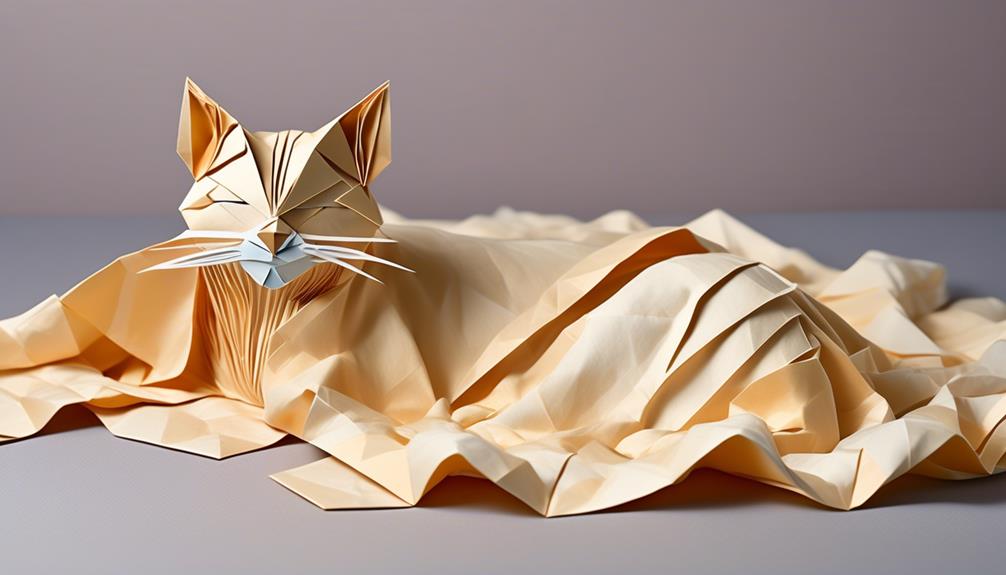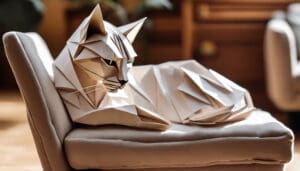Your senior cat enjoys grooming just like you find comfort in a gentle touch. It helps them relax and eases their old age pains, beyond just keeping clean.
As their muscles grow weary and their joints tender, your compassionate strokes become a balm to their old bones. The brush in your hand isn’t just a tool; it’s an extension of your care, gliding through their fur to untangle knots that they can no longer reach.
Spending quiet time grooming your aging pet strengthens your bond and provides them comfort.
Let’s examine how this calming practice affects their well-being. Each brush stroke not only soothes their skin but also benefits their emotional health.
Key Takeaways
- Gentle grooming is important for senior cats as they may be less diligent with self-grooming due to discomfort or decreased mobility.
- Lack of grooming can lead to painful mats and additional discomfort, so regular grooming helps prevent mats and eases daily life for senior cats.
- Grooming promotes healthy skin and coat, prevents skin infections, and helps maintain body temperature regulation in senior cats.
- Regular grooming sessions provide bonding time between the cat and its owner, enhancing the overall well-being of senior cats.
Understanding Senior Cat Grooming
As your cherished senior cat enters its golden years, you’ll notice it mightn’t be as diligent with self-grooming as it once was, often due to the discomfort of conditions like arthritis or decreased mobility. Understandably, this shift in their grooming habits can lead to painful mats and additional discomfort, making your role in their care ever more vital.
Senior cat grooming goes beyond cosmetic appeal; it’s about comfort and health. Brushing your older cat gently can prevent those troublesome mats and ease their daily life. Remember, a cat with matted fur may be signaling to you that they’re battling with more than just a bad hair day; underlying health issues such as dental pain, obesity, or increased skin oil production could be the culprits.
When you take up the brush for your senior cat, choose a spot where they feel secure and loved. Use brushes suited for their delicate skin and be extra careful around sensitive joints. The frequency of grooming sessions will vary—long-haired breeds might need your tender touch more often, including the occasional bath.
In serving your senior cat with this intuitive, gentle care, you’re not just grooming them—you’re providing a soothing touch that speaks volumes of your love and dedication.
The Importance of Regularity
You know your senior cat craves comfort and routine, and regular grooming sessions provide just that.
Maintaining a consistent schedule promotes coat and skin health while providing security.
This predictability greatly reduces their stress, enhancing their later years with peace and closer relationships with you.
Routine Benefits Health
A regular grooming routine offers profound health benefits, ensuring your senior cat remains free from discomfort and potential health issues. As you tenderly care for your beloved cat, grooming your senior cat becomes a serene gesture of love that can:
- Prevent matting and hairballs, which in turn helps to prevent any irritation or skin infections.
- Allow for the early detection of physical changes that might signal health concerns, ensuring prompt veterinary care.
- Reduce stress and anxiety, contributing to a serene environment for your aging friend.
Your intuitive understanding of your cat’s needs, coupled with a compassionate approach to their care, not only enhances their well-being but also deepens the precious bond you share.
Predictability Reduces Stress
Building on the foundation of a regular grooming routine, it’s worth noting how this consistency serves as a calming anchor in your senior cat’s world, easing their stress levels.
Regularly brushing your cat and speaking to them soothingly helps reduce their stress by creating a predictable and secure environment. This routine helps lessen their anxiety through consistent, comforting interactions.
This regularity allows them to acclimate to the grooming process, alleviating any fear or discomfort associated with it. By following this care routine, you’re not only making their fur look better, but you’re also supporting their mental health, allowing them to go through their old age more calmly and peacefully.
Selecting Appropriate Tools
When caring for your aging cat, selecting the right grooming tools is essential to ensure their comfort and well-being. As their guardian, it’s your job to make grooming a soothing experience, and the tools you choose play a significant role in this.
Here are a few considerate selections you can make:
- Soft-bristled slicker brushes are gentle on sensitive senior skin.
- Steel combs work best for long-haired beauties, carefully untangling without pulling.
- Rubber brushes double as a gentle massage tool while whisking away loose fur.
Your intuitive understanding of your cat’s needs will guide you to the brush that feels just right in your hand—soft enough to glide through their fur, yet effective enough to keep their coat healthy. A rubber brush can be particularly comforting, as it mimics the loving touch of your hand while helping with shedding.
And when it’s time to attend to their nails, a pair of nail clippers with sharp blades and a comfortable grip will make the process smooth for both of you. Remember, your goal is to nourish their soul as well as their coat, making every stroke of the comb or brush a testament to the care you have for their twilight years.
Gentle Brushing Techniques
To make grooming your senior cat less stressful, choose a comfortable place like a soft mat where they feel secure. When you start to brush your senior cat, keep in mind that you’re not just grooming them, but also providing them with comfort and care, which is very important for your aging pet.
Start by softly stroking your cat from head to tail, noting any sensitive areas that might require more care. Make your touch calming to build a trustful environment. Use soft brushing methods suitable for older cats with more fragile skin. Choose the right brushes, such as a rubber brush for easy detangling or a metal comb for removing loose hair, and be careful not to pull their coat too hard.
If you find mats in fur, don’t cut them. Use your fingers or corn starch to gently separate them instead. Be careful around joints and sensitive spots, and talk to your vet if you find any worrying lumps or bumps.
Minimizing Bathing Stress
You know how stressful baths can be for your senior cat, so let’s make it a soothing ritual together.
Warm water isn’t just about cleanliness; it’s a comfort that can ease your cat’s muscles and mood during bath time.
I’ll share tips on how to transform these necessary moments into opportunities for bonding and relaxation for both of you.
Warm Water Benefits
Easing into a bath of warm water can diminish the bathing stress for your aging cat, providing a relaxing and therapeutic experience that caters to their senior needs. The warm water benefits extend beyond mere cleanliness. As you gently groom your beloved pet, consider how the soothing touch of warm water can make a world of difference:
- The warmth relaxes muscles, easing any discomfort or tension.
- Soothing for arthritic joints, it turns a bath into a comforting ritual.
- Maintains body temperature, safeguarding against the chills.
Your intuitive understanding of these benefits shows your deep compassion for your senior cat’s well-being. By incorporating warm water into the grooming process, you’re not just cleaning; you’re nurturing their spirit and honoring their golden years.
Bath-Time Bonding Tips
Establishing a serene atmosphere with gentle, calming vocal tones can alleviate your senior cat’s anxiety during bath time.
Begin by preparing a quiet space where the splashing of warm water will feel like a comforting embrance rather than an alarming deluge. Ensure the water’s warmth mirrors your affection, just enough to caress their underbelly without overwhelming them.
Before the bath, engage in gentle grooming; brushing to untangle their coat eases the cleansing process and fortifies your bond.
Select a cat-specific shampoo, steering clear of their sensitive head and face, and rinse meticulously. Afterward, swaddle them in a towel, offering your warmth until they’re completely dry.
These bath-time bonding tips turn a necessity into a shared moment of trust and care for your senior cat.
Trimming Nails Safely
When trimming your senior cat’s nails, it’s esential to prioritize their comfort by using calm, soothing tones and selecting the right tools for a safe and gentle grooming experience. As they age, cats can become more prone to various injuries, and their joints may not be as flexible as they once were. It’s essential to handle their paws with care and to use the proper cat nail clippers designed for their needs.
- Choose the Right Clippers: Opt for scissor clippers or guillotine clippers that are sharp and designed for the thicker nails of senior cats.
- Trim Below the Quick: Cut the nails just below the quick to avoid pain or bleeding. If you’re unsure about the proper length, it’s always better to err on the side of caution.
- Reward Your Cat: Offer treats or praise after trimming to associate the experience with something positive, reinforcing good behavior.
Your gentle touch and the quiet reassurance of your voice will help ease any anxiety your cat may feel. If you notice any irregularities in their nails or if their joints call your vet for guidance. Remember, keeping your cat comfortable during their twilight years is a beautiful way to give back the love they’ve always shown you.
Cleaning Ears and Eyes
As your senior cat’s guardian, you understand the importance of maintaining their hygiene.
This includes the careful cleaning of their ears and eyes.
Using cat-specific products, you can prevent ear infections and keep their eyes clear, ensuring their comfort and health.
It’s all about providing that gentle touch and reassurance during grooming to help your cat feel secure and cared for.
Senior feline Hygiene
Caring for your senior cat’s ears and eyes is a essential aspect of their overall health, ensuring they remain comfortable and infection-free as they bask in their golden years. It’s important to remember the gentleness required when attending to these sensitive areas.
Here’s how you can maintain their hygiene with compassion:
- Ear Care: Regularly check and clean their ears to prevent infections, being extra delicate to avoid discomfort.
- Eye Maintenance: Gently wipe away any discharge to keep their eyes clear, which helps to stave off infections.
- Overall Grooming: Brushing not only keeps their fur neat but also allows you to inspect their skin for any issues.
Ear Cleaning Benefits
Understanding the benefits of ear cleaning for your senior cat not only enhances their comfort but also plays a critical role in preventing infections that can affect their quality of life.
As your cat gets older, they might not be able to clean themselves as well as before. It’s important for you to help by cleaning their ears regularly. This helps to remove wax buildup and spot any problems early that might need a vet’s care.
Approach this task with a gentle touch and a compassionate tone, reassuring your cat throughout the process. By taking the time to carefully clean their ears, you’re providing a service that’s as nurturing as it’s necessary, ensuring their twilight years are as comfortable and healthy as possible.
Eye Care Essentials
Keeping your senior cat’s eyes clear of discharge and debris is just as essential as maintaining clean ears, ensuring their comfort and preventing potential health issues. You know how much your cat relies on their senses, and taking the time for eye care essentials is a testament to your devotion.
Here’s how you can help keep their face dry and their vision sharp:
- Gently wipe around each eye with a clean, damp cloth to remove any crust or discharge.
- Check for signs of irritation or unusual weeping, which could indicate a health concern.
- Regularly visit the vet for eye health checks as they age.
Your compassionate care provides the comfort and safety your senior cat deserves, reinforcing the special bond you share.
Managing Matted Fur
Regularly brushing your cat’s coat as they age helps prevent matted fur and discomfort. Gently grooming your cat is not only about maintaining their coat but also shows your care for your elderly pet.
When you encounter matted fur, approach it with kindness. Gently loosen the mat with your fingers or a sprinkle of corn starch, which can make the process easier for both you and your beloved pet.
Use a comb to help brush through their fur, selecting tools with softer bristles that are kinder to their delicate skin. It’s important to resist the urge to cut or pull at the mats, as this can cause unnecessary pain.
If the matting seems too severe, it’s best to seek assistance from a professional groomer or your veterinarian. They have the expertise to handle your cat’s needs without causing harm.
Regular veterinary check-ups are also paramount in managing your senior cat’s coat health. By staying vigilant, you can address any underlying health issues that may contribute to matting and ensure that your cat remains comfortable and content throughout their twilight years.
Recognizing Signs of Discomfort
Making sure your older cat’s fur doesn’t get matted is a way to show love. It’s just as important to notice when they’re in pain or uncomfortable, which they may show through small changes in how they act or groom themselves. Since you know your cat better than anyone, trust your feelings if you think something is wrong.
Remember, cats are experts at masking their pain, but as their compassionate caregiver, you can learn to spot the telltale signs of discomfort.
Pay close attention to these behaviors:
- A decrease in grooming activity can point to areas that are sensitive or painful.
- Your once energetic companion may slow down or avoid jumping onto their favorite spot, which could mean they are experiencing joint pain.
- Unusual litter box habits or changes in appetite may also be signs that something isn’t quite right.
It’s essential to approach this with an understanding heart. Recognizing signs of discomfort in your aging cat isn’t just about observation—it’s about feeling empathy for their situation. If you notice any of these behaviors, don’t hesitate to seek veterinary advice. Your gentle touch and attentive care can make all the difference in their golden years.
Professional Grooming Options
Exploring professional grooming options can offer your senior cat the gentle care and attention they deserve, ensuring their comfort and easing the challenges of self-maintenance.
When you take your cat to a professional groomer, you’re not just tidying up their coat; you’re providing a service that supports their health and well-being. Professional groomers have the expertise to safely handle your cat’s delicate skin and aged joints, turning what could be a stressful situation into a serene experience.
These specialists are adept at identifying and addressing common age-related grooming issues, such as matted fur that can cause discomfort or overgrown nails that may impede mobility. This attentive care can help prevent painful conditions and maintain your four-legged friend’s quality of life.
Frequently Asked Questions
Should You Groom an Old Frail Cat?
Just like you would take care of an old wine, you should also take care of an old cat. It’s important to gently groom your elderly cat to keep them comfortable and healthy.
Is Grooming Calming for Cats?
Yes, you’ll find grooming your cat to be calming for them as it mimics the affectionate licks of their mother and helps build a trusting relationship between you both. It’s truly a nurturing act.
Do Cats Feel Better After Being Groomed?
Grooming your cat can make them more comfortable by reducing discomfort, enhancing cleanliness, and identifying health issues, helping keep your pet happy and healthy in their later years.
Do Cats Get Better at Grooming With Age?
You’ve noticed your senior cat isn’t grooming as well anymore. It’s common; arthritis and muscle loss can hinder their ability. Gentle grooming by you can prevent pain and keep them comfortable.




